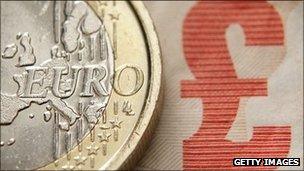Lib Dem conference: Michael Moore slams Tory MPs EU bid
- Published
- comments

Some Conservative MPs say the UK should be trying to repatriate some powers from the EU
Attempts by Conservative MPs to try to use the eurozone crisis to get powers back from the EU are "deeply damaging", a Lib Dem cabinet minister has said.
Scottish Secretary Michael Moore told a Lib Dem conference fringe event it was important to minimise "noises off".
Senior Tory backbencher Mark Pritchard is urging, external David Cameron to hold a referendum on Britain's EU membership.
The Lib Dems have traditionally been the most pro-European of the major UK political parties.
'Internal cliques'
Party members packed out a meeting at the Birmingham conference on Sunday evening to hear a panel including Mr Moore and party grandee Baroness Williams give their thoughts on the eurozone crisis.
Mr Moore said it was important the UK remained "central" to the debate: "We can't enjoy the geographic luxury of being at the side of Europe to be symbolic of our position politically."
He said further fiscal integration between eurozone members was becoming "inevitable" and there was a danger the UK could be excluded if "internal cliques" emerged.
"It would be very bad for Europe and for the UK if we were marginalised in that process."
He said Chancellor George Osborne was engaged in the debate and it was important that the UK's financial expertise was used, as part of efforts to get growth going.
"All of this needs to be done in the context of ensuring that in Britain, we minimise the noises off so nobody sees this as an opportunity to widen the scope of the debate, and look at this as a way of getting in there to get a debate going over powers that might come back to the UK.
"It's deeply damaging and I think it has been very encouraging to hear what the prime minister and others have been saying in the past week or so."
Referendum lock
Baroness Williams said ministers had made "some quite encouraging and thoughtful remarks" - including the prime minister, foreign secretary and chancellor - but added: "Remarks are important but they don't have quite the same weight as acts of parliament."
She was concerned about the "referendum lock" brought in by the coalition in the European Union Act 2011, which she said could cause problems for France and Germany as they seek to resolve the crisis.
The referendum lock guarantees that no major transfer of powers from London to Brussels can happen without a public vote.
Baroness Williams said fiscal integration - such as tax co-operation between eurozone countries - was now likely and it would require "a substantial new treaty" or amendment to the Lisbon Treaty.
But under the referendum lock, that could potentially trigger a referendum in the UK even though it is not a eurozone member, she argued.
"Now just think for a moment of the implications of that. One of the big three stepping in to make it almost impossible for the other two to bring about the major reform that is needed."
"We've got ourselves frankly, in just as much of a bind as have our fellow European leader nations."
Foreign office sources stressed that fiscal integration by eurozone countries would not be seen as a transfer of power from the UK to the EU and so would not trigger a referendum.
Treaty negotiations
Earlier at the conference, Lib Dem Chief Secretary to the Treasury Danny Alexander described Eurosceptics as the "enemies of growth".
More than 100 Conservative MPs, many of them newly-elected last year, formed a new eurosceptic parliamentary group last week - which aims to reshape the UK's relations with the EU.
The group aims to recruit support from other parties at Westminster with the aim of putting pressure on the prime minister.
They anticipate EU treaty negotiations later this year and say they want to be prepared for negotiations on how the UK can start to take powers back.
And the chairman of the influential Conservative backbench 1922 committee, Mr Pritchard, went further on Monday, urging the prime minister told hold a referendum on the wider issue of the UK's EU membership.
He told the Daily Telegraph: "For many Britons, the EU has already become a kind of occupying force, setting unfamiliar rules, demanding levies, curbing freedoms, subverting our culture, and imposing alien taxes."
David Cameron has said he could push for a renegotiation of existing EU rules on employment and financial regulation at an appropriate time in the future.
But the government says that closer fiscal integration in the eurozone is in Britain's interests and the Conservatives' coalition agreement with the Lib Dems says Britain will remain "a positive participant in the European Union".
- Published18 September 2011
- Published17 September 2011
- Published17 September 2011